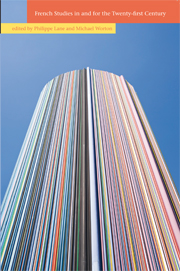Book contents
- Frontmatter
- Contents
- Notes on Contributors
- Foreword by Baroness Jean Coussins
- Foreword by His Excellency Bernard Emié
- Part I Contextualisations
- Part II Research and Public Engagement Strategies
- Part III The Place of Women and Gender in French Studies
- Part IV The Place of Literature
- 9 Integrated Learning: Teaching Literature in French
- 10 Oxford, Theatre and Quarrels
- 11 Defining (or Redefining) Priorities in the Curriculum when the Good Times have Flown
- Part V The Place of Linguistics in French Studies Today
- Part VI Theatre, Cinema and Popular Culture
- Part VII Area Studies, Postcolonial Studies and War and Culture Studies
- Part VIII Adventures in Language Teaching
- Appendices. Addresses to the Future of French Studies Conference
- Index
11 - Defining (or Redefining) Priorities in the Curriculum when the Good Times have Flown
from Part IV - The Place of Literature
- Frontmatter
- Contents
- Notes on Contributors
- Foreword by Baroness Jean Coussins
- Foreword by His Excellency Bernard Emié
- Part I Contextualisations
- Part II Research and Public Engagement Strategies
- Part III The Place of Women and Gender in French Studies
- Part IV The Place of Literature
- 9 Integrated Learning: Teaching Literature in French
- 10 Oxford, Theatre and Quarrels
- 11 Defining (or Redefining) Priorities in the Curriculum when the Good Times have Flown
- Part V The Place of Linguistics in French Studies Today
- Part VI Theatre, Cinema and Popular Culture
- Part VII Area Studies, Postcolonial Studies and War and Culture Studies
- Part VIII Adventures in Language Teaching
- Appendices. Addresses to the Future of French Studies Conference
- Index
Summary
‘Where are French Studies going in this era of financial constraints and cut-backs?’ This is a question that is posed repeatedly in the media as the bad news about budget cuts and falling enrolments filter out from schools and universities around the UK. Our first response is to shout out to anyone who is listening that of course university language courses are useful, necessary and enriching and that of course we should be encouraging students to pursue them in ever larger numbers. Governmental decisions in the past decade have ensured that our numbers are dropping – confirming what all the language professionals consulted back in 2003 predicted – but in 2010 they were dropping in step with massive cuts in funding and that produces a very worrying scenario of self-fulfilling prophecy. Questions about where we are going in French Studies can always prompt a useful reflection on just what we do and how we do it but this time those questions are no longer simply heuristic or solely posed for the purpose of intellectual debate. When the role of the arts and humanities in a liberal education is being challenged on a regular basis and language learning becomes a political and ideological football lobbed from one party's court to another, it is really up to us, the practitioners, to intervene, arbitrate and set the tone of the discussion.
- Type
- Chapter
- Information
- French Studies in and for the 21st Century , pp. 129 - 138Publisher: Liverpool University PressPrint publication year: 2011
- 1
- Cited by



